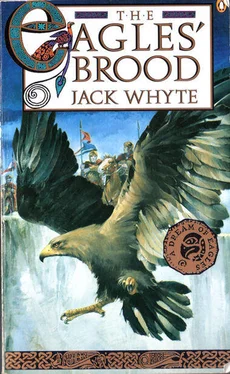I have no sense of faith that men will read the words I write. None live whom I would wish to read this tale, and only few who could. The men who roam this land at will today are brutal, fierce in their savagery and awful in their pagan ignorance. They know no gods but Lust and Gluttony, no love but Satiety, and their women match their baseness. The art of reading and writing is dead in Britain. And yet I write, because I must. Mine is the only voice left, though muted to scratchings on parchment, to tell this tale of what once was and what might—could—have been.
All of the treasures that filled Camulod are shrunk to four, and they are lodged with me here in this small stone hut. One is a window of glass, so clear and fine as to be almost transparent. One is a mirror of lustrous, polished silver, owned by my aunt Luceiia long ago—I retain it in memory of her beauty, keeping it clear and untarnished, but have not dared to look into it these thirty years. Another is the wondrous, shining sword that is my sacred trust. It lies securely hidden in the pit concealed at the rear of my dwelling.
The fourth of these treasures has value to my eyes and mind alone. It is a tiny mountain of papyrus and fine parchment, covered in the writing of four clear, separate hands, one of them my own.
Now that I am old and toothless, I am driven to continue and complete the chronicle begun by my grandfather Caius Britannicus almost a century ago, and carried on by his friend, my great-uncle Publius Varrus. Even my father, Picus Britannicus contributed a few of his personal evaluations and followed this family's tradition of struggling to find words to write down to describe the lives we have led.
I have been a scribbler since childhood, aping Uncle Varrus, who would spend hours each day writing in his parchment books. But I could frighten myself, I think, were I to give way to the awe I feel when I open my chests of parchments and papyrus and look at the sheer bulk of what still remains of all I have collected. For years now, I have been winnowing these writings, burning the major part, the trivia, and setting aside those elements essential to the telling of my tale. The first part is done, and ashes lie mounded in a shrunken, rain-sodden hillock in front of my house, here in my hidden valley in the hills. My sole remaining task is to arrange the remnants in sequence and provide sufficient additional details to bridge the few gaps that yet persist. All I require to achieve that end is time, and time I have—time in abundance. Longevity is my penance; fidelity to my tale, my burden.
This tale is mine, to a great extent, since mine was the living of it. Much of what I have written, however—the parts I did not experience directly—I discovered simply because I am Merlyn and men feared to lie to me, believing me magical. I did not care to disillusion them, since it suited my purpose later in life to be both magical and feared. Those attributes ensured my solitude, and therefore my freedom to do what I must do, and I taught myself well to be uncaring of what men thought of me.
I taught myself well, I say, but it was far from easy. I was not always lonely, nor feared and shunned by men. As a boy, my name was Cay, short for Caius Merlyn Britannicus, and I had a sunny childhood, unmarred by pain or sorrow. As a young man, I enjoyed my status as a leader in our Colony and my life was filled with laughter, with adventures, and with friends. Later still, I learned the joys and the grief of love—and lived beyond them, filling my days with duty as men did at that time, until my forty-second year. Only then did I learn the awful secret that divorced me forever from the lives of other, ordinary men and brought to me the status of Sorcerer and all the allied pains of solitude.
I was born in the year that brought catastrophe to Britain: .the first year of the new, fifth century from the birth of The Christ, the year the Christians call 401 Anno Domini. The world our fathers had known disappeared forever in the course of that fateful year, when the great change began, and yet the awful significance of the change itself was slow in penetrating our world.
It was not that the word spread slowly—the speed of calamitous news is always swift—but this cataclysm was so huge, so overwhelming in its implications, that it defied credence, so that people, hearing the news and passing it along to others, remained themselves unwilling to countenance the truth of it. It was so appalling, so terrifying in its ramifications, that people would not talk of it. They could not digest it. They could not believe it. Yet neither could they long avoid it, for the emptiness of the roads, stretching unmarched for mile after silent mile, bore witness to the truth of it. The brashness of thoughtless children playing noisily in the streets of the deserted camps bore witness to the truth of it. The keening of abandoned women, deserted in thousands throughout the land, bore witness to the truth of it. And the terror of the people of the eastern and southeastern coasts and of the northern reaches below the great wall Hadrian had built bore witness to the truth of it.
The Eagles had departed, flown away. The Legions had been called home. The Armies were gone, leaving only a skeleton presence to maintain a show of strength while the Empire struggled for its life elsewhere. Within six years, even the few legions left behind had followed that first exodus, and after four hundred years of Pax Romana —Roman peace, protection and prosperity in Britain—the country lay soft and undefended, at the mercy of her enemies.
BOOK ONE -Hatchlings

I
I was six years old by the final year of the great evacuation, awakening to my life in the colony we called Camulod, which, like Rome itself, had been built on a hill and dedicated to the high ideals that built the great Republic. It was Publius Varrus's wife, my great-aunt Luceiia, who had thought of naming the Colony Camulod, in honour of Camulodunum, her brother's—my grandfather's—birthplace, an ancient place sacred to Lod, war god of the tribe of Celts the Romans had named the Trinovantes. Today men call it simply Colchester, meaning the fort on the hill, but her brother had refused to use that new, brash, graceless name. By modifying the ancient name to fit a new location, Luceiia Britannicus had honoured both her brother and his monument.
One of the first lessons I learned in extreme youth was that things had not always been as they were. Camulod had not always been rich in horses, nor had its economy been purely equestrian. It had been my own father who had changed everything, I learned, the year that I was born.
My father was Picus Britannicus, and his title was Legate, or General. He was Supreme Cavalry Commander and Deputy in Britain for the great Flavius Stilicho, Commander-in-Chief of the Armies of the Emperor Honorius. In the year of my birth, 401 in the Year of Our Lord and the eleven hundred and fifty-fifth year of Rome, Alaric, war chief of the barbarian Visigoths, had threatened invasion of the Roman heartland itself. He had penetrated as far as Stilicho's home city of Milan before Stilicho was able to assemble an army by means of an emergency summons for all uncommitted Legions to return to Italia to combat the threat. My father, a close personal friend of Stilicho as well as a trusted colleague and confidant, had answered that summons, embarking immediately with most of his troops and as many horses as he could transport in the time and the vessels available to him. The remaining stock, no less than six hundred and eighty prime animals, he had left in the care of his father, my grandfather, the proconsul Caius Britannicus, who had been named by Stilicho Legatus Emeritus —Supreme Commander—of the Irregular Armies of South-west Britain. The charge implicit in my grandfather's title was the interim governance of the south-west, and the protection of its territories against invasion, pending the return of the Imperial Legions following the defeat of Alaric and his Visigoths.
Читать дальше










